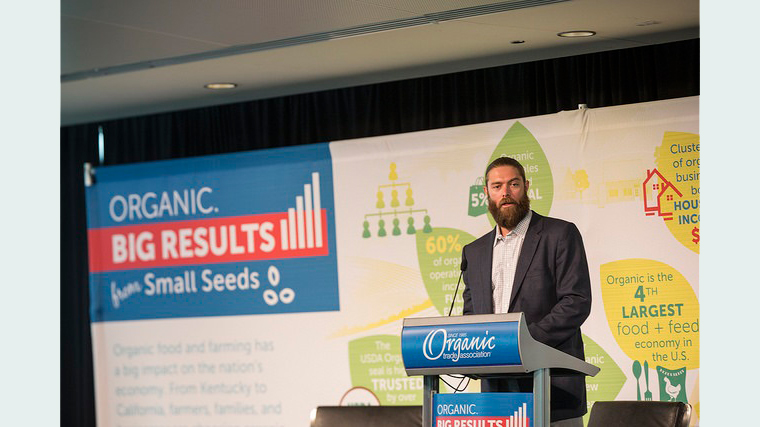Jayson Werth is outstanding in his field as a professional baseball player for the Washington Nationals but when starting an organic farming business in 2009 he admits to being out of his league.
“At the beginning we were clueless,” said Werth, speaking at the Organic Trade Association’s Policy Conference in May. “We had no idea what we were doing. We just knew we wanted to be organic.”
Werth and his wife, Julia, decided to start an organic farm after they saw health benefits from eating organic food. About 10 years ago, Werth said he was having a difficult time staying healthy.
Then he started eating organic, stopped eating dairy and gluten, and avoided genetically modified foods.
“Once I started eating organic produce and grass-fed meats, my career took off,” he said.
Werth was a key member of the Philadelphia Phillies team that won the World Series in 2008 and made the Major League All-Star team in 2009.
In 2009 Werth launched an organic farming business, purchasing 280 acres in central Illinois, not far from his hometown of Springfield.
“I wanted a farm that would match my philosophy of food and diet,” he said. “I didn’t want toxic chemicals on my property and my crops or on my family’s food.”
He started the farm even though he said: “We had no idea what we were getting into.”
Werth started growing corn, soybeans, and wheat. “A consultant recommended a four-year rotation with one fallow year,” he said.
After the three-year transition he had a successful crop. “After that my operation was off and running.”
Since then, Werth has added three more parcels of land and now has nearly 500 acres. He also developed a wetland and wildlife preserve and planted 1000 trees with native grasses. Wildlife includes rabbits, pheasants, deer, and quail. He also has four beehives.
“We have a goal of obtaining 1000 more acres by the time I retire with an ultimate goal of 10,000 acres under management,” Werth said.
He launched a consulting business to help other farmers convert to organic production.
“That is essential going forward,” he said. “People wanting to transition need help and the tools to do so. We are preparing to help those in need.”
Werth emphasized the importance of GMO labeling. “The lack of GMO labeling is unacceptable. I should have the right to know what I’m putting in my body and so should anyone.”
Looking forward, Werth said that organic farming would be his “next life” after retiring from baseball.
“Long-term this is where I’m going to put my attention and my energy. I’m excited to be part of the solutions to deliver to organic farming and ultimately to organic consumers.”









